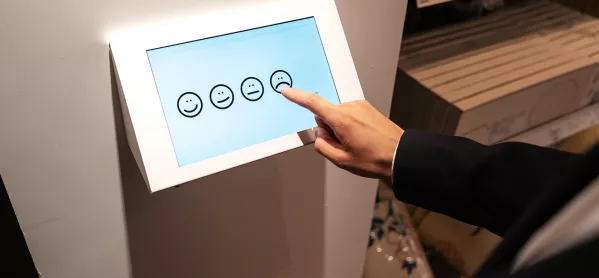2022 had fewest ‘requires improvement’ Ofsted grades

The proportion of primary and secondary schools judged to “require improvement” in full inspections in 2022 was at the lowest level since the Ofsted grading was first created, according to new analysis.
This data is contained in a new analysis by SchoolDash which has looked at Ofsted inspection outcomes and reports over almost two decades.
The analysis has broken down graded inspection outcomes by Ofsted judgement for the past 17 years.
It shows that the proportion of schools judged to “require improvement” over a full calendar year is at its lowest level since the inspection grade was introduced in September 2012.
- Background: 70 per cent of RI schools upgraded
- Pressure: DfE pushing ahead with plan to intervene at schools twice rated less than ‘good’
- Ofsted: How the focus of inspection has shifted
Ofsted gives schools one of four judgements to schools in graded inspections: “outstanding”, “good”, “requires improvement” or “inadequate”.
A breakdown of graded inspections for 2022 shows that 4 per cent of schools were judged to be “outstanding”, 69 per cent were rated “good”, 22 per cent were found to “require improvement” and 5 per cent were judged to be “inadequate”.
Twenty-two per cent of schools being judged to “require improvement” in graded inspections is lower than in any calendar year since the first full calendar year it was in use (2013), according to the SchoolDash analysis.
The data, published today, also shows an increase in the proportion of schools rated “inadequate” compared with last year. Five per cent of full graded inspections resulted in an “inadequate” judgement in 2022 compared with 4 per cent in 2021 and 2 per cent in 2019, the last calendar year before the pandemic.
There was also an increase in the proportion of schools judged to be “good”. The data shows that almost seven in 10 (69 per cent) of schools received this judgement in 2022 - the highest proportion of primaries and secondaries recorded in a calendar year covered by the SchoolDash analysis going back to 2006.
The SchoolDash analysis has looked at inspection outcome by calendar year. Ofsted data is presented by academic year.
According to the watchdog’s own data for 2021-22 outcomes of graded inspections, 25 per cent of all schools were rated as “requires improvement”, which was the lowest figure for an academic year since 2014.
The declining number of schools rated as “requires improvement” comes at a time when the stakes on that judgement have been raised by the government.
Last year it extended its powers to intervene in what it describes as “coasting schools”.
If any school gets consecutive Ofsted judgements of less than “good”, the Department for Education can now intervene to issue an academy order on the school or rebroker it into a different academy trust.
The DfE can use these powers to intervene at a school even at an academy where one of the “requires improvement” judgements relates to a predecessor school.
Previously, the DfE could only intervene in this way if a school had received an “inadequate” judgement.
Last year, Ofsted revealed that more than two-thirds of schools that were previously rated as “requires improvement” improved to “good” or “outstanding” ratings in graded inspections in the 2021-22 academic year, meaning they will avoid the new government threshold for intervention.
Why was ‘requires improvement’ created?
Ofsted’s previous chief inspector Sir Michael Wilshaw introduced the grade to replace the previous judgement of “satisfactory” in 2012.
At the time he said: “If you listen to what previous chief inspectors have said when they’ve produced their annual report, they say things like ‘satisfactory’ is not good enough, the quality of teaching in ‘satisfactory’ schools is not good enough, the progress of children in ‘satisfactory’ schools is not good enough, and I think we need to be straight with parents, and honest with them, and say that ‘satisfactory’ is a false designation.”
The SchoolDash analysis also provides a tool to explore which topics have become more or less common in inspection reports over the past 17 years.
This data shows that words such as “leadership” and “curriculum” have become increasingly common while others including “assessment”, “attainment” and “progress” have declined.
You need a Tes subscription to read this article
Subscribe now to read this article and get other subscriber-only content:
- Unlimited access to all Tes magazine content
- Exclusive subscriber-only stories
- Award-winning email newsletters
Already a subscriber? Log in
You need a subscription to read this article
Subscribe now to read this article and get other subscriber-only content, including:
- Unlimited access to all Tes magazine content
- Exclusive subscriber-only stories
- Award-winning email newsletters
topics in this article



